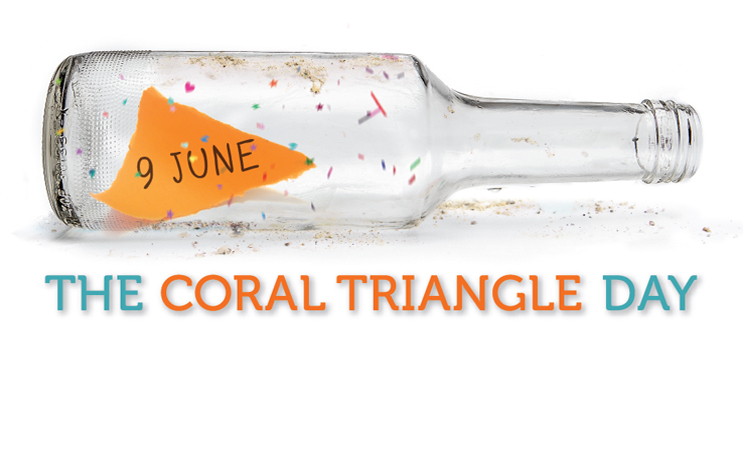What is the Coral Triangle Day and why are we celebrating it on June 9?
What is the Coral Triangle Day and why are we celebrating it on June 9?
 The Coral Triangle Day is envisioned to be an annual, open-sourced event that brings together individuals, organizations, and establishments on one special day of the year to shed light on ocean conservation and the numerous ways to protect and conserve the Coral Triangle.
The Coral Triangle Day is envisioned to be an annual, open-sourced event that brings together individuals, organizations, and establishments on one special day of the year to shed light on ocean conservation and the numerous ways to protect and conserve the Coral Triangle.
The event will be celebrated in countries in Coral Triangle region - Indonesia, Malaysia, Papua New Guinea, Philippines, Solomon Islands and Timor-Leste, through numerous activities including but not limited to: beach clean-ups; sustainable seafood dinners and exhibitions; bazaars; and beach parties, among others—all carrying the message of ocean conservation under the overall banner of the Coral Triangle Day.
The first Coral Triangle Day was celebrated on June 9, 2012 in conjunction with World Oceans Day which is celebrated every year on June 8. The goal of the Coral Triangle Day is to position the Coral Triangle as a globally-significant eco-region—a modern day icon of the natural world so that millions of people learn more about its significance to their everyday lives and are empowered to take specific actions to help conserve and protect this natural treasure.
The theme or main message of the Coral Triangle Day in 2013 is: Shared Waters, Shared Solutions: Coming Together as One for the World's Centre of Marine Life—The Coral Triangle. The confluence of seas in this region that flawlessly sew and hem one country to another is what forms the panoramic tapestry of diverse cultures and traditions in the Coral Triangle. This theme will highlight the common lifeblood that binds the Coral Triangle countries together into one spectacular region and espouse a spirit of camaraderie among people to collectively protect and conserve this shared treasure.
The Coral Triangle Day is intended to be an open-sourced event where any individual, organization, or establishment can organize anything they want in relation to the Coral Triangle in particular, and ocean conservation in general. Examples of events or activities on this day are: beach clean-ups; sustainable seafood dinners and exhibitions; bazaars; fashion shows; ocean film festivals; beach parties; and many more.
All activities happening around the region on this day will be prominently featured online at www.thecoraltriangle.com/day supplemented by regional publicity and social media.

Paolo Mangahas
Communications Manager
WWF Coral Triangle Programme
pmangahas@wwf.org.my
| # | Documents | Filesize |
|---|
Marine plastic pollution is a crisis that transcends borders, impacting not only the natural environment but also the very fabric of our societies. Its consequences, both known and unknown, reverberate through our oceans, affecting wildlife, contaminating fish stocks, and degrading the delicate habitats that support a rich biodiversity. The urgency to address this global emergency cannot be overstated.
| # | Documents | Filesize |
|---|---|---|
| 1 | 357,529 KB | |
| 2 | 34 MB |
| # | Documents | Filesize |
|---|
The New CTI-CFF NCC Member States Logos derived from the SOM-12 decision on Reports of Governance Working Groups (Annex 11) point 11.1 Coordination Mechanism Working Group (CMWG) point 11.1.4 read as the following:
"Acknowledged and endorsed amendments to the CTI-CFF logo"
Due to limitation of web capacity to accomodate the CT6 Member States of each respective NCC, the logos are put in the google drive at the following address:
https://drive.google.com/drive/folders/0B6a1MJGX-zVsRnY0bnI4cFdhRlU
- Type:
- Outreach Materials
- Country:
- Indonesia |
- Philippines |
- Solomon Islands |
- Malaysia |
- Papua New Guinea |
- Timor-Leste |
- Australia |
- Brunei
| # | Documents | Filesize |
|---|---|---|
| 1 | 967,806 KB |
The CTI Women Leaders Forum developed the Gender Equality and Social Inclusion (GESI) Policy as a critical tool for ensuring the CTI-CFF as an inclusive regional platform for achieving its marine conservation and resource management goals.
| # | Documents | Filesize |
|---|
Flip charts for use with facilitator’s guide and booklet, to 'Help Sustain Community Benefits Through Management for Fisheries, Ecosystems, and Climate Change'
| # | Documents | Filesize |
|---|
Flip charts for use with facilitator’s guide and booklet, to 'Help Sustain Community Benefits Through Management for Fisheries, Ecosystems, and Climate Change'
| # | Documents | Filesize |
|---|
| # | Documents | Filesize |
|---|
| # | Documents | Filesize |
|---|

